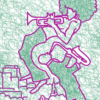
Courtesy of Wayne Escoffery
On April 11, the Ellington Jazz Series featured the Black Art Jazz Collective — a jazz sextet founded in 2012 — in its only concert this year.
The concert took place at 4 p.m. and featured several of the collective’s original pieces. The Black Art Jazz Collective’s members include Wayne Escoffery, a professor at the Yale School of Music, as well as jazz musicians Jeremy Pelt, James Burton III, Victor Gould, Rashaan Carter and Johnathan Blake. The Ellington Jazz Series is led by Artistic Director Thomas C. Duffy and brings Black jazz musicians to campus each year.
“I said, ‘I’d hate to have this whole year go by and not have an Ellington event,’” Duffy said he told Escoffery. “I said, ‘Could you safely get together and record something in a studio in New York, in a manner that we could stream this as one of our events?’ And God bless them, they put their masks on and went into a studio in New York a month ago.”
In 1972, jazz legend Duke Ellington performed in Woolsey Hall, marking the birth of the Ellington Jazz Series, a Yale concert series that invites renowned jazz musicians each year to perform at Yale. Upon Ellington’s performance, professor Willie Ruff established an endowment to fund campus visits from well-known jazz musicians.
Now, Duffy determines which artists are invited to participate in the series and uses Escoffery as a consultant for the series.
“He values my input, and together we come up with a diverse artist lineup of musicians who exemplify the highest level of excellence and integrity in their music,” Escoffery said.
Sunday’s performance included pieces from the group’s latest album release, titled “Ascension.” Burton, the group’s trombonist, said the show was structured as a live performance, with uncut complete takes of all selections and “all the fire and spontaneity” of a typical live performance. The recording also included a brief session for questions and discussion at the end.
Burton noted that several selections were inspired by the band’s identity and by topics they consider important. For instance, Escoffery’s composition “Involuntary Servitude” addresses the 13th Amendment and the history of policing and incarceration in the United States. “Tulsa,” a piece by Burton, is about the 1921 massacre that occurred in the eponymous Oklahoma city, in an area known as “Black Wall Street.”
“I think I can say we hope the audience digs all of the fire, love, humor, sincerity, precision, abandon, wit, grit, camaraderie and unapologetic Blackness that has come to be part and parcel with the BAJC experience,” Burton said.
The collective’s origins trace back to 2012, when Escoffery met with trumpeter Pelt and drummer Blake and discussed the prospect of putting a band together. According to Burton, members’ impetus for the band was to celebrate the African American ancestral roots of jazz music “unapologetically” through original compositions and by saluting Black social, political and artistic icons that have “enriched the global community.”
Soon after, the three musicians reached out to others, and later Burton, Gould and Carter joined. The group has recorded three albums and completed a world tour.
Typically, several jazz groups and artists are invited every year to perform as part of the Ellington Jazz Series. These musicians also interact with the New Haven community during their visit — for example, invitees including Louis Hayes, Tootie Heath and Billy Hart visited public New Haven schools when they came to perform.
Before the pandemic, Duffy hoped to commemorate 50 years of women at Yale with a lineup of female artists. Duffy said he intended to include bass players or drummers, since these forms of jazz were historically unconventional for females. However, Duffy decided to defer inviting these artists until in-person performances could take place.
Along with a live performance, invitees often have their stories recorded for the Yale Library’s Oral History of American Music archives. Duffy said these records are “substantial” and conducted by professional musicologists. Since invited artists would be unable to devote time to these interviews, Duffy decided to postpone the commemoration instead of speaking with artists virtually.
In past years, artists invited to perform in the Ellington Jazz Series have included Arturo Sandoval, Frank Wess, Catherine Russell, Bernie Williams and Ruff.
Marisol Carty | marisol.carty@yale.edu
Update, Apr. 13 12:38 a.m.: This story has been updated with additional detail from Duffy regarding how musicians interact with New Haven when they come to perform as a part of the series.








